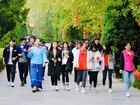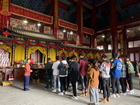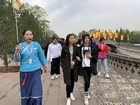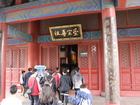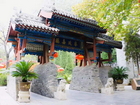"finding the Root of Ancient Tree" -- the impression of Shanxi Studies (2)
"where is my hometown? Shanxi Hongdong big locust tree. "
This ballad is widely spread in Hebei, Henan, Shandong and other places. The wind and rain of history has long diluted people's memories of their ancestors, but they have not forgotten the place where their ancestors came-the big locust tree in Hongdong, Shanxi.
On October 20, 2019, teachers and students of the second year of senior high school came to the only sacred place of people's sacrifice with the theme of "finding roots" and "ancestor worship" in the country. Here, we see the family rules of each surname, and see the expectations of our ancestors for our people.
The locust tree is an auspicious tree here. The ancient locust tree is regarded as a "god tree." at the beginning, the immigrants were trapped in their hands, and when the officers and soldiers were forced to hit the road with knives and guns, many people grabbed the big locust tree one after another, just like holding their loved ones by the hand. Those officers and soldiers could not drive away with sticks, so they drew their swords, cut off the locust branches pulled by the people, and drove off the immigrants. The ruthless sword separated the immigrants from the big locust tree, but the immigrants looked at the locust tree and still did not want to throw it away until the immigrants were escorted farther and farther away, and the big locust tree in their hometown gradually disappeared. Only the locust branch in their hands became a symbol of the ancient locust tree in people's minds. When I came to Hongtong County, I didn't hear the mournful cry of Su San's rise and solution. What I heard and saw was the persistent pursuit of the "root" of the Chinese nation. The students picked up the red ribbon and piously tied up the ancient Huai branches. We put our hands together and silently wish our family health and prosperity before our surnames play the ranked. No matter what the surname is, we are all descendants of the Chinese Emperor, our roots are closely linked, hands reach out to the distant sky.
Knowledge Tip 1: why is there only a "Untie-hands field" in Hongtong County? (no toilets and washrooms)-in the early Ming Dynasty, there was a "King Yan sweeping the North" war, the two armed forces fought in Shandong, the people of Shandong suffered, and nine out of ten of the people of Shandong died in the war. The earth was stained with blood, and the bones were covered with no one to bury it. At that time, because they were unable to complete the tax task of handing over to the state, the local officials one after another played the imperial court and decided to emigrate from Shanxi and Hebei to Shandong. On the way, the escorted personnel need to defecate, can only asked the escort soldiers, the soldier said: "OK, I will untie your hand." This is the case with all escort brigades. After a long period of time, the word "untie-hands" is used. In daily life, people turn "defecation" into "untie-all-hands" and "urination" into "untie-half-hands", which is still in use today.
Knowledge Tip 2: "back hand", "hand in hand". One is the "back hand". Many people say that the back hand is also a typical feature of the descendants of the big locust tree, because when emigrating under the big locust tree, in order to prevent the people from running away, people are walking with their hands tied back. walking for many days has become a habit. Up to now, the descendants of the big locust tree still have this habit. Now they walk with their hands on their back, but they also feel quite comfortable. The other is "even the hands". In Hongdong and many places, friends are also called "connected hands" because when immigrants move out, their hands are strung together on a rope, and they share their joys and sorrows with each other. After a long journey, they share their joys and sorrows, and when they arrive at their destination, they become friends who are affectionate and affectionate. This word is generally used to express extremely affectionate friends, and only to very good friends can they use it.





